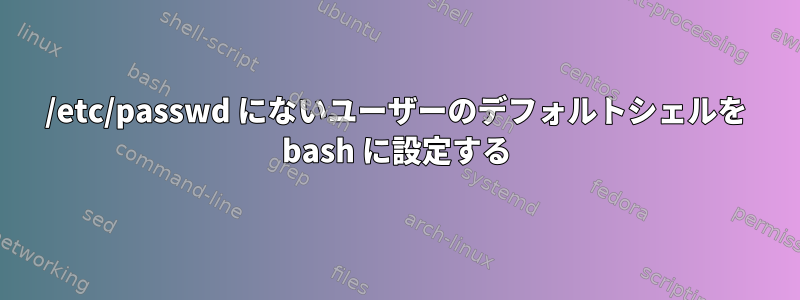
当社のUbuntu 15.10デスクトップシステムでは、Active Directoryを介したログインに基づいていくつかの魔法を使用しています。PBIS。したがって、私のホームディレクトリが/ etc / passwdにあっても、私のユーザーアカウントは表示されません/home/local/FOOBAR/dotancohen/。編集する/etc/passwd行がなく、使用できない場合は、bashをシェルに設定する方法はchsh?
このコンピュータには管理者アクセス権を持つ別のアカウントがあるため、必要に応じてシステムを管理者として構成できます。しかし、ユーザー専用のソリューションがあれば、今後は管理者権限がないときに使用するのが良いと思います!
以下は、Unity(Ubuntuデスクトップ)でGnome端末を開いて実行したいくつかの主要なコマンドの結果です。
$ echo $HOME
/home/local/FOOBAR/dotan
$ whoami
FOOBAR\dotancohen
$ grep dotan /etc/passwd
$ grep sourced ~/.profile
echo 'sourced .profile'
$ grep sourced ~/.bashrc
echo "sourced .bashrc"
$ echo $SHELL
/bin/sh
$ echo $TERM
xterm
$ bash
sourced .bashrc
- dotan-tm():~$ echo $SHELL
/bin/sh
- dotan-tm():~$ echo $TERM
xterm-256color
ご覧のとおり、両方をインポートすると.bashrcエコーされます。基本シェルの起動時ではなく、bashの起動時に実行されるよう.profileです。使った.profile.bashrcこの回答ダッシュでbashを開きましたが、.profileスクリプトが明らかに実行されていないため、何の効果もありません。
~/.profile参照用のファイル全体は次のとおりです。
$ cat .profile
# ~/.profile: executed by the command interpreter for login shells.
# This file is not read by bash(1), if ~/.bash_profile or ~/.bash_login
# exists.
# see /usr/share/doc/bash/examples/startup-files for examples.
# the files are located in the bash-doc package.
# the default umask is set in /etc/profile; for setting the umask
# for ssh logins, install and configure the libpam-umask package.
#umask 022
# if running bash
if [ -n "$BASH_VERSION" ]; then
# include .bashrc if it exists
if [ -f "$HOME/.bashrc" ]; then
. "$HOME/.bashrc"
fi
fi
# set PATH so it includes user's private bin if it exists
if [ -d "$HOME/.bin" ] ; then
PATH="$HOME/.bin:$PATH"
fi
xmodmap ~/.Xmodmap
export PATH="$PATH:$HOME/.rvm/bin" # Add RVM to PATH for scripting
[[ -s "$HOME/.rvm/scripts/rvm" ]] && source "$HOME/.rvm/scripts/rvm" # Load RVM into a shell session *as a function*
case $- in
*i*)
# Interactive session. Try switching to bash.
if [ -z "$BASH" ]; then # do nothing if running under bash already
bash=$(command -v bash)
if [ -x "$bash" ]; then
export SHELL="$bash"
exec "$bash" -l
fi
fi
esac
echo 'sourced .profile'
$
答え1
PBISを使用すると、すべてのユーザーに対してデフォルトのシェルを定義できます。
#/opt/pbis/bin/config LoginShellTemplate /bin/bash
これはrootとして実行する必要があり、ユーザーまたは権限のないユーザーはこの設定を変更できません。これはすべてのADユーザーのデフォルトシェルになります。


